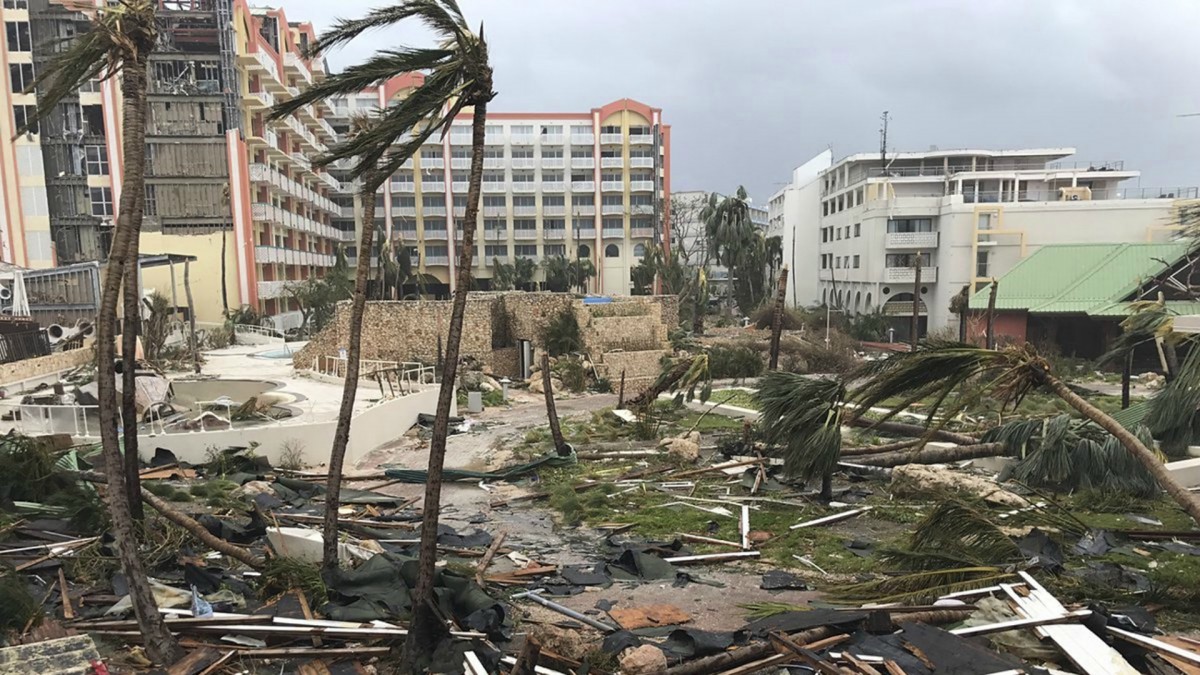Hurricane Irma bringing more destruction following Harvey
September 14, 2017
INDIANOLA, Iowa — As residents of Texas were recovering from Hurricane Harvey, people of Florida were preparing for Hurricane Irma, which made landfall Sunday, Sept. 10.
Courtney Kersey, a Simpson student whose family lives in Florida, said residents took note of what happened in Texas and made sure to prepare for Hurricane Irma.
Kersey’s parents, brother, sister-in-law and nephew live in Cape Coral, Florida — two hours away from Miami. Her parents and 5-month-old nephew evacuated to Iowa but said her brother and sister-in-law stayed behind.
“My sister-in-law works for the sheriff’s department, and she’s a dispatcher, so she can’t leave,” Kersey said. “Because when the storm hits, she obviously has to go out and help people.”
Her parents had not prepared much for the storm, but they did put on hurricane shutters before evacuating. Kersey’s brother and sister-in-law, on the other hand, stocked up on the recommended three-day supply of food and week supply of water. Along with hurricane shutters, they also put sandbags around their house and moved their valuables to a central location inside plastic totes.
The town of Cape Coral ran out of gas last week, according to Kersey. Her parents were still able to leave but said the drive to the Florida border took twice as long as usual with the additional traffic. As for her brother and sister-in-law, she was afraid for them to stay behind.
“I think it’s really cool that they’re staying and that they are helping people, but it’s borderline terrifying,” Kersey said. “Just because there’s so many unknowns, and I’ve never actually had family down there during a hurricane, so I don’t know what that means.”
Junior Danielle Bates also has family living in Florida who have never before experienced a hurricane.
Bates was in Florida during the second week of classes to celebrate her grandfather’s 70th birthday. She said there was no talk of the hurricane when she arrived Friday, Sept. 1.
“When I first got there, no one was really worried about the hurricane because it still said it was going to hit the West Coast,” Bates said. “Monday is when they said it’s probably going to hit southern Florida, and that’s when people started to get really scared and grocery stores and gas stations started emptying out.”
Bates got back to campus safely and said her mom and grandparents headed to northern Florida Friday, Sept. 8. They headed north two hours but planned on staying with family in Georgia if it became too bad.
Some people weren’t taking the hurricane threats seriously, according to Bates, and her uncle didn’t evacuate.
“My uncle has kids, too, and their school is even canceled,” Bates said. “I’m just worried and also scared because both my uncle and his girlfriend’s cars are messed up, so they couldn’t leave if they wanted to.”
She worried for her uncle and his family, but said she was most concerned for the health care patients her mom cares for.
“One of the reasons why she has to stay later is because they have to make sure all of those people are safe, and so that worries me more than my family because I know they can leave, but a lot of these people have nowhere to go,” Bates said.
Feeling helpless with everything going on has been hard for Bates. She said she got lucky because she was able to leave Florida with all of her belongings still at Simpson, but her family couldn’t bring everything they had in their small cars. Bates said her mom and grandparents brought important items, though, such as birth certificates.
“I’m happy I’m not in it, but not happy because I can’t help,” Bates said.
The eye of the hurricane passed over Naples, Florida, on Sunday, Sept. 10, according to the National Hurricane Center (NHC). Life-threatening wind and storm surges from Irma continued in the Florida Keys and southwestern Florida and spread into central and northwestern Florida Sunday night and Monday.
The NHC said wind hazards from Irma spread throughout Georgia and into portions of Alabama, Tennessee, South Carolina and North Carolina. It caused flash flooding from intense rainfall in those areas, along with significant river flooding.
“If anybody is in the means to help, do,” Kersey said. “I mean, we obviously saw what happened with Harvey and how bad that was, so even not necessarily money, but if you can send a pack of diapers or something, little things like that are huge to the people that are there.”
Bates also suggested sending items such as canned food and feminine care products, because canned food is important, and items such as feminine care products are often not given out during disasters.







